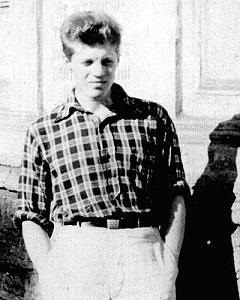The current anniversary of Alexander Kondratov's death (1937-1993) coincided with the completion of my reading of his last published book "Lemuria".
The key to the past?” (it appeared in the popular discipline series “Reports from the Borders of Knowledge” by Iskry publishing house). The Polish reader is known for 2 more works by this author: “The Secrets of the 3 Oceans” (Wiedza Pszechna, Warszawa 1980) and “The Lost Civilizations” published twice (in 1971 and 1983) in the prestigious series “The Roots of Civilization” of the State Publishing Institute.
The author was an "enfant terrible" of russian science, and can be compared only with a likewise comprehensive interest and likewise incorruptible to the findings of academic discipline by the Norwegian author and investigator Thor Heyerdahl (Kondratov participated elsewhere in the 1960s. in the russian academic investigation squad dealing with the mathematical analysis of linguistic data collected by Heyerdahl on Easter Island during his celebrated archaeological expedition in 1955).
Alexander Kondratov was a poet (series began writing at the age of 10, prose at the age of 14, critical literary works at the age of 16), a author (his archive has not yet been full organized, he most likely includes respective novels, respective collections of short stories, about 20 volumes of poetry) active besides in the nonconformist Leningrad literary underground (where he utilized the pseudonym "Sendi Konrad"), a screenwriter of films, a translator (including Henry Miller, whose work was a lover), a mathematician (his first technological work "Mathematics and Poetry" of 1962 was devoted to the mathematical analysis of the poem), cybernetics (at the turn of 1970/1980 he experimented with computer poem modeling, the effects of his work announced at conferences in Repino and Vancouver), a linguist, archaeologist (parted in investigation expeditions – besides oceanic and underwater).

Alexander Kondratov
However, the most extended part of Kondratov's work is popular discipline – he was the author of more than 200 popular discipline articles and fifty-two popular discipline books, translated into more than 20 languages and published in the USSR and abroad in more than 5 million copies. Kondratov wrote, among another things, about geology, oceanography, paleontology, archaeology, ethnology, linguistics, mathematics, but above all about the expected "down lands" he wanted to prove.
The author of “Lemuria” was besides (or was) a detective (in 1950s he graduated from a militia school, where he came into contact with the work of Vasily Rozanov – !), a tube lover, sportsman, yogin, Buddhist (the full wall of his flat was occupied by symbols and Buddhist devoation). His acquaintances point to his extraordinary temperament, the certainty of his rations, 1 could say "inner-sterility", the causes of which were seen in the origin of his parent from Cossacks of Donsk.
‘Lemuria. The key to the past?” is the author’s erudite performance in the fields of cognition of his interests. Here we have an accurate geographical description of the construction of the Indian Ocean and its bottoms – details about individual islands and mountain ridges are sometimes related to facts so tiny that it is not adequate to verify them to scope the universal geographical atlas. We inactive get the geological past of Earth and a summary of the main theories about it. The next 2 chapters are devoted to biological evolution – mammals, primates and yet man. Then from natural sciences we jump to the teachings of man and follow the evolution of human races and languages, the aftermath of civilizations and the past of telling us about them archaeological discoveries, myths and motives in religions relating to Tamil's subject for the book, writings and literary monuments, civilization of the Indus Valley, Interuncle and Ancient Egypt. We even get a query of arabian and medieval European travel accounts, where there were mentions of sunken lands in the East Ocean.
All this awesome cognition was arranged by the author to prove the basic thesis of the book: that there was a continent on Ratnakar, possibly from which primates originated, which had sunk into the ocean waters inactive in prehistoric times, but possibly inactive several-several thousands of years ago – so in times immediately preceding the birth of the first civilization or the present process. According to Kondratov, it was the remnants of this continent that were the oldest cradle of civilization, and the refugees from it gave birth to Dravidian peoples, civilization of the Indus Valley, culture of Obijdu and influenced the improvement of civilization in Egypt. This thesis, which we can say with certainty today, and which was actually clear already in 1978, erstwhile Kondratov wrote his work, is completely false.
Kondratov's argument raises serious doubts about this, as he quotes works a twelve or even a fewer decades earlier than his own, while ignoring the newer ones – specified as the monographs Oleg K. Leontjewa (his books are besides available in Polish) – containing information contrary to his speculations. Condratov is so based on outdated papers, and he silences those who impart cognition to him in the modern but false to his own thesis. besides many examples cited by Kondratov in support of him are already obsolete present – we already know that the ramapitekas were ancestors of modern orangutans alternatively than praludzi.
The Kondratov's question of historical applications and accounts on the Paradise lands located in Ratnakar, about which ancient and medieval sailors and travelers frequently repeated that they were on their way to China. erstwhile I read these richly quoted by the author of the “Lemuria” accounts and reports describing the lost islands as covered with “racial” vegetation and densely populated, I immediately thought of the Sundaean Islands and the Malay Peninsula. Kondratov, however, persistently silences them, giving them unsupported speculation about the sunken land.
In my opinion, in Kondratov we are dealing with an attitude akin to that of Heyerdahl: both of them were characterized by an interior conviction of their own rightfulness so strong that it led to disregard of the facts. "Let's effort to put it better: self-confidence. Kondratov's incredible assurance that he will be able to stand up to everything he takes on. Peaceful self-confidence" wrote in his mention of the author of “Lemuria” by Kiryl Kobrin. The words Hegel could be cited here "If the explanation does not agree with the facts, the worse for the facts."
Today, and possibly during the period of its release, “Lemuria. The key to the past?” is just a curiosity from lame. Almost surely this position, as well as the another 2 translated into Polish by Kondratov's book, will not be resumed. Reading it present does not make any peculiar sense, due to the fact that since it was written, cognition in all areas that scope it has gone far ahead. Already during the publication of the book, the information contained in it was partially outdated and partially incomplete.
The position remains a memorial to the circumstantial intellectual culture of Russia and subjected in the second half of the 20th century to the influences of Russian countries where natural sciences, technological fantasy and futurism have penetrated so densely that it is sometimes impossible to draw a clear discrimination between them. In Russian fantasy (but besides in the Polish period of communism), the word "scientific" was not an empty ornament.
On the another hand, the authors of fantasy have sometimes shown themselves to be convinced supporters of “Oschorom” views, specified as Marek Oramus, who is besides seriously “ufologia” or fantasizing contemporary about Slavic paganism Czesław Białczyński in Poland. In Russia, discipline has frequently turned into fantasy through futurism and futurology. Fantastics was written as quasi-scientific or philosophical treatises – hence different popularity to this day in Russia and its circles of Stanisław Lem.
Kondratov himself considered himself a futurist and futurologist, provided by discipline with cognition to make bold visions of the future. He was in this and very “communist”, and very “Russian”, and very “Slavic”. What should not be said, the russian estuary finds a large passionate impulse of Russians in the 20th century, which echoed besides in neighbouring countries – even those so historically anti-Russian as Poland – expanding the dynamics of their national life.
Therefore, Kondratowa could have been released in Poland years ago and that is why in a sense it is for us – or at least for those of us who realize the phenomenon of the October Revolution – understood. In a sense, Kondratov's voice echoes the dynamics of our own Slavic ethnos.
Ronald Lasecki
Think Poland, No. 23-24 (8-15.06.2025)






![Poseł do Knesetu Ofer Kasif dla OKO.press o walce przeciw izraelskiej okupacji Palestyny [WYWIAD]](https://cdn.oko.press/cdn-cgi/image/trim=126;0;134;0,width=1200,quality=75/https://cdn.oko.press/2025/10/AFP__20230113__336Z76U__v1__MidRes__PalestinianIsraelConflictDemo.jpg)









